CCES Winter School 2013
"The whole flow of the program was just an incredible experience not only intellectually but most of all because of the fun we had throughout."
Participant 2013
A group of truly international participants
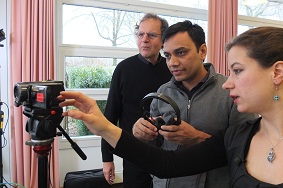
A group of 23 PhD candidates and postdocs from three ETH Domain institutions and seven universities in Switzerland, Austria, Italy, Germany, England, China, and Japan came together for two block weeks in January and February of 2013. The aim was to intensively work on the opportunities and potentials offered by science-practice interfaces to address challenges of sustainable development. By discussing concepts of knowledge sharing between scientific and societal stakeholders, the participants were equipped with skills to organize and implement real stakeholder interactions. They analyzed transdisciplinary processes, the role of media and communication, and the added value of knowledge management tools to bridge diverse perspectives. On February 5, 2013, the participants hosted a stakeholder workshop and a focus group with representatives from civil society, communal offices, private industry, associations, and non-governmental organizations. In both stakeholder interactions, the transition of the energy system was the topic for discussion and exchange. The partakers used several methods to facilitate the interactions between science and practice. Concrete communication products emerged from the stakeholder meetings and in a post-processing workshop the participants had the chance to discuss their findings and conclusions with energy experts from science and administration. As in previous years, a team of experienced and cross-referencing lecturers and coaches supported the learning process. The Winter School 2013 took place at the Propstei Wislikofen outside the daily work environment of the participants. The Winter School was again organized by the Competence Center Environment and Sustainability CCES of the ETH Domain. CCES gratefully acknowledges the financial support from the SUK Doctoral Program and the ETH Zurich Rectorate.
Dialoguing and exchanging with stakeholders
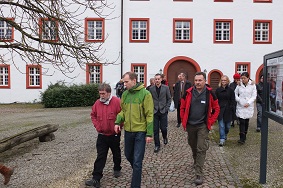
After learning about the conceptual background of the ways of how to manage knowledge interfaces and enhancing knowledge sharing, the participants implemented their knowledge and organized nearly real-life situations with real stakeholders. The topic of the CCES Winter School 2013 – «the Swiss Energy Transition» – created much response and allowed to collect a lot of insights. The Swiss energy transition is a topic relevant also for the region as well as the municipality of Wislikofen. The focus group with local people representing the civil society allowed the collection of views and perspectives. The stakeholder workshop with representatives from the local population, administration, associations and non-governmental organizations revealed frictions as well as collaborative efforts to align better the local, regional, and national activities in making the energy transition happen.
"Consultation"
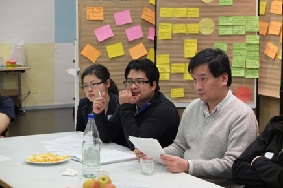
The task of the "consultation" group was to organize a focus group with representatives of the local population. The goal was to gain insights how the general public understands the issues around energy. Two of the Swiss German speaking participants facilitated the focus group along a pre-defined questionnaire and documented by two note takers. The focus group was streamed live into another room where the rest of the Winter School participants could watch and discuss amongst them.
The focus group guests were invited by a local political leader; they were of different age and gender. Selected key findings were that the people are confident about the future and that they see synergies and opportunities by the energy transition. There was a strong sense for local energy production versus imported energy. The focus group guests showed a strong sense for context and complex thinking and pointed at the power games related to system change. They identified the necessity for a trade-off between savings and economic development.
The Winter School participants processed and synthesized the results and came up with seven areas of further questions. They presented these questions to two energy experts from the federal energy research centre Paul Scherer Institute (PSI) and the Swiss Federal Office for Energy.
"Collaboration"
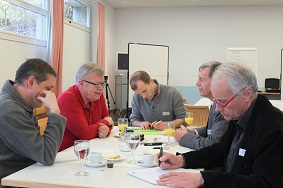
The group "collaboration" invited various stakeholders of the municipality and the region around Wislikofen to discuss the opportunities and challenges as well as the implementation of the energy transition on a community level.
During a short walk and discussion about a local energy saving initiative, the stakeholders and scientists established first contacts and exchanges. Afterwards, the facilitators guided the group of stakeholders into focused discussions by applying a number of knowledge management and facilitation tools. The results were visualized and synthesized and grouped according to identified challenges and opportunities. Among the challenges were small community structures, lacking flexibility of infrastructure, political planning security and involvement of citizens, and behavioral change. Emerging opportunities were seen in a change of electricity price structure, scaling effects, energy saving measures, attractiveness of community, energy ID for houses, and enhanced use of roofs for hybrid photovoltaic installations. Emerging questions from the discussions point out key issues: i) is there a disconnect between the federal, cantonal, and local level in the energy transition implementation?; ii) what kind of capacity building for (small) communities is required?; iii) what role can multi-scale participatory processes play in the energy transition implementation?
The Winter School participants presented the results of both the focus group and the stakeholder workshop to two energy experts from the federal energy research centre Paul Scherer Institute (PSI) and the Swiss Federal Office for Energy. This allowed the participants to reflect about the stakeholder interactions and results in an additional dimension.
"Information"
The Winter School participants who chose to work in the information group had the choice between several information products.
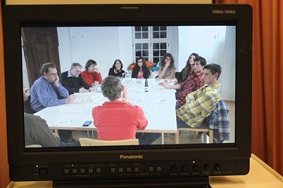
A sub-group of seven people decided to produce a video about the learning process the Winter School participants were going through during the Winter School. For that they benefited from the professional coaching and video equipment from the ETH Zurich Multimedia Services. See video
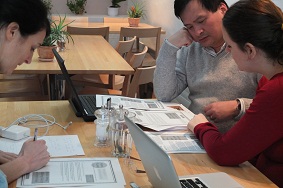
A sub-group of two people worked together on the production of a range of newsflashes related to the topics tackled in the Winter School. The newsflash that made it into the final stage describes the method of the stakeholder constellation and includes elements to playfully think and reflect about the stakeholder involvement and constellation in individual projects. Download See newsflash (PDF, 1.2 MB)
The information group provided an interesting meta-level perspective on what is happening during the Winter School.